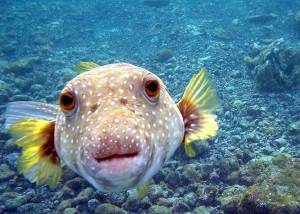 SHEFFIELD, Eng. – An evolutionary researcher from the United Kingdom claims that there will come a day when humans could grow beaks, much like some species of fish.
SHEFFIELD, Eng. – An evolutionary researcher from the United Kingdom claims that there will come a day when humans could grow beaks, much like some species of fish.
Dr. Gareth Fraser is a biologist at the University of Sheffield, which is a major research institution in north-central England. In a recent research paper published in the journal Developmental Biology and entitled “Common developmental pathways link tooth shape to regeneration,” Fraser suggests that humans’ dental structure may one day be significantly modified.
For instance, in the next 50 years, he believes scientists will be able to change certain cells in people’s mouths to allow for constant dental regeneration. In other words, instead of just growing the traditional “baby” and “adult” teeth, individuals would be able to grow unlimited sets of teeth—much like some animal species.
“With our extended lives and modern diets,” Dr. Fraser told the Daily Mail, “the limited supply of human teeth is really no longer fit for purpose. … Our research is focused on looking for ways in which we can replicate the way that fish create an endless supply of teeth and bring this capability to humans.”
Furthermore, Dr. Fraser proposes that—several million years from now—humans may grow toothy “beaks” which would closely resemble those of pufferfish. He claims such an arrangement would be more advantageous than what humans currently possess.
“It could be possible for humans to evolve to grow beaks, like pufferfish, which may be more robust and practical,” he explained to the Daily Mail.
In essence, evolutionists believe pufferfish obtained their beaks through slow, gradual changes, and humans have the ability to do likewise.
Ralf Britz, a fish researcher who helped Dr. Fraser with similar research last year, says the development of a beak structure appears to be “a major evolutionary leap,” but can actually be accounted for by “tiny steps in development.”
“Our study shows how evolution can produce highly modified morphological structures by just tinkering slightly with developmental programs,” he stated in a news release from the U.K.’s Natural History Museum. “Our results are nicely summarized in the Latin sentence ‘Natura non facit saltus,’ Nature does not make jumps.”
However, creationists argue that it would be scientifically implausible for humans to ever grow fish-like beaks, or any new bodily feature at all. In an email interview with Christian News Network, Paul Taylor and Eric Hovind of Creation Today firmly stated that it would “not be possible” for humans to “one day grow beaks.”
“This would require genetic information which is not part of the human genetic pool,” they stated. “New information would have to be produced spontaneously. Such randomized production of new genetic information is impossible, according to the First Law of Information Science, which states that information cannot spontaneously arise from matter.”
Ultimately, say Taylor and Hovind, evolutionists’ worldview leads them to these faulty conclusions.
“Evolutionists have a worldview, in which increases in genetic information can only be explained as occurring by random chance, as they do not accept the idea that God — even if they believe in Him, is actually at work in the world. They refuse to acknowledge God as Creator. The reason for this is given in Romans 1:20-22:
‘For since the creation of the world His invisible attributes are clearly seen, being understood by the things that are made, even His eternal power and Godhead, so that they are without excuse, because although they knew God, they did not glorify Him as God nor were thankful, but became futile in their thoughts and their foolish hearts were darkened. Professing to be wise, they became fools.’”
Become a Christian News Network Supporter...


